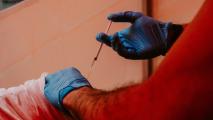Face masks, gowns, and other types of personal protective equipment (PPE) are healthcare workers’ first line of defense, but the surge in coronavirus cases has left many hospitals without enough protection to go around.
Faced with this PPE shortage, workers have had little choice but to reuse disposable items — a situation that puts them at increased risk of catching the coronavirus.
“There’s no way you’re not getting it if you are working in the emergency room with the bare minimum protection,” New York nurse Benny Mathew told NPR, who caught COVID-19 in March after repeatedly reusing the two N95 masks his hospital issued him per week.
Help could be on the horizon. Researchers from the University of Pittsburgh have created a virus-repelling coating that has the potential to not only solve the current PPE shortage, but also make new equipment even more effective at protecting workers.
Ending the PPE Shortage
The Pitt team’s coating is like teflon — water, blood, and other liquids roll right off the fabric.
The study, detailed in the journal ACS Applied Materials and Interfaces, also found that the coating repels two adenoviruses that can cause acute respiratory illnesses.
Next, they plan to test its ability to repel SARS-CoV-2 and other coronaviruses.
If it can, applying the coating to coronavirus workers’ PPE could provide them with better protection against the virus — it would no longer be able to spread throughout a hospital by hitching a ride aboard a mask, gown, or pair of gloves.
Even more impressive than this added protection, though, is the coating’s potential to address the current PPE shortage.
Disposable PPE is ideal for preventing the spread of viruses — by swapping out their PPE between patients, healthcare workers can avoid transmitting viruses between them.
Reusable PPE, such as cloth masks or gowns, can also effectively stop the spread of viruses, but only if disinfected between patients — something that takes time workers simply don’t have during a pandemic.
By covering reusable PPE with the new coating, workers wouldn’t have to worry about viruses clinging to the equipment and spreading throughout a hospital during the course of their shift.
This could have a huge impact for healthcare workers and even the general public.
Eric Romanowski
Unlike teflon, the Pitt team’s coating is also incredibly durable. The researchers subjected coated fabric to extensive abrasive washing and even scraped at it with a razor blade, and the material still repelled liquids.
That means a healthcare worker could wear a mask all day, wash it, and then experience the same virus-repellent benefits the next day and the next — knowing their reusable PPE is as unlikely to spread viruses as an unused disposable version.
“The durability is very important because there are other surface treatments out there, but they’re limited to disposable textiles,” researcher Paul Leu said in a news release. “You can only use a gown or mask once before disposing of it.”
“Given the PPE shortage, there is a need for coatings that can be applied to reusable medical textiles that can be properly washed and sanitized,” he continued.
COVID-19 and Beyond
In addition to testing the coating against the novel coronavirus, the Pitt team also plans to research a more efficient way to apply it to materials.
Right now, they use a syringe to drop the coating onto a fabric, which wouldn’t be ideal for mass applications. They suspect, however, that it may be possible to spray it on or even dip materials in the coating.
If so, the coating could be applied not only to PPE, but also waiting room chairs or even hospital beds, as a way of preventing viruses from spreading.
Something else the researchers need to figure out is the cost — if their approach is too expensive to scale up, it will never gain traction with hospitals.
Still, if they can work out the kinks, the antivirus coating could go a long way towards addressing the coronavirus PPE shortage and even protecting people from viruses long after the COVID-19 pandemic is over.
“(T)his could have a huge impact for healthcare workers and even the general public if PPE, scrubs, or even clothing could be made from protein, blood-, bacteria-, and virus-repelling fabrics,” researcher Eric Romanowski said.
We’d love to hear from you! If you have a comment about this article or if you have a tip for a future Freethink story, please email us at [email protected].






